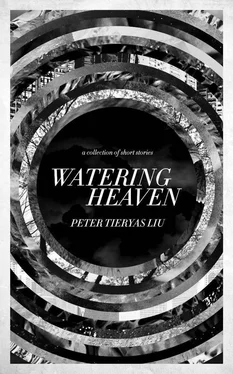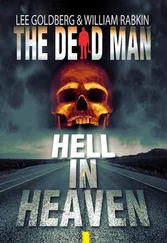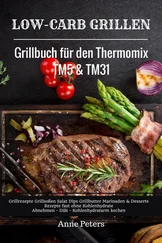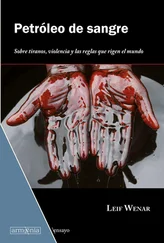“I used to be a chef,” I answer.
“But?”
“But I quit after I lost my sense of taste and smell.”
“You don’t smell anything?”
I shake my head. “It was the dumbest mistake of my life. I had to try every exotic food, ate something in India that nearly killed me.”
“There’s no such thing as a mistake. Only discontent after the fact,” she says.
“I was too greedy,” I reply, feeling dizzy.
She slaps me in the face, takes me to the bathroom. The mirror rises up like a barricade. Neither of us is reflected. I turn to her, shocked. She laughs and says, “It doesn’t matter what you’ve done if you can’t see your reflection.”
“But I want to see.”
“Then shatter the glass with your fist.”
When I hesitate, she smiles. “You never told me a secret.”
Before I can answer, she turns around. A second later, she’s vanished. I can’t see her anywhere.
I’d come across the troupe after I lost all my money investing in a Beijing-based company that sold weather. They promised thunderstorms and sunshine. Climatology , they were called, like some rock-star inspired cult with pagan deities. People were queuing to be proselytized, and I was one of the first to be chosen, then sacrificed — my hundred thousand dollars became a granule inside a frigate of waste and, after they went bankrupt, I wandered China in a daze. I met a circus act of expats who’d also lost their way. They were performing in a pedestrian underpass. It was Iris with her self-immolation, her ‘Christmas tree of conflagration’ stunt, that made me beg them to recruit me. “Barry here can freeze his whole body. Tammy has pubic hair longer than her legs. What the fuck can you do?”
“I can die,” I replied.
They laughed and were about to dismiss me. But Iris stared and asked, “How long?”
Long enough to live. I wondered those seconds before death — does she feel my desire? Does she know I stare at the way fire meanders across her wrist, the way the oily crevasses reflect in her mastoids and the sharp accents of her clavicles? She reminds me of a charcoal painting with her chaff knuckles and her veins resembling broken pipeworks mired in corpuscles — a symbiotic car crash of mitochondria and guts.
She talks like an airport intercom messenger. “Paging Milton. Go drown yourself.”
Iris locks the glass cage. A makeshift audience has gathered. I’m vying for their attention, competing against their cell phones. Water mixed with green tea leaves explodes out like a fusillade. I drown and die; the cage releases the water.
Resurrected by CPR, I drink 60 % proof er gou tou and stumble around camp. I enter Iris’s tent and ask, “When was the last time you made love?”
She replies, “I need fire to get aroused.”
“Burn us,” I tell her.
Her eyes gleam. “A lot of people think they can handle the heat.”
“Burn us,” I say.
She sets her arms on fire, her lips curling. Sweat beads on her forehead and it crinkles in delight. She puts a match to my pants. I smell embers like they’re dead hope and I can see the blurry mistakes of my past.
“You want me to stop?” she asks.
I shake my head and the fire consumes us, greedy rivets stumbling over one another to get higher. I press my fingers against her bony back, her spine feels like bolts. She shivers and she’s crying from pain. Her tears whet the fire. “You’re insane,” she says.
The pain is becoming unbearable, the heat a scorching machete ripping my calves open. “Best way to quench passion is to kill it.”
“Who killed yours?” she asks.
“My bosses, friends, my ex… you?”
She sucks in the smoke. “Me.”
“Let’s kill you then.”
“How?”
I grab her hand and run towards the water tank.
“I’m not like you, I might not come back,” she says.
“It’s easy. Just swim towards the light.”
“What light?”
“The one you see when you blink and your breath stops. Ignore all the voices calling out to you pretending they’re the people you loved.”
“Who are they?”
“Death herself,” I answer. We jump in and lock the cage. Water bursts out, quelling the fire. I kiss her and swallow her burnt breast. There’s desperation in our fingers; every sense is acute in our race against the end. She closes her eyes, exhales, bubbles run up her face; I draw the last air from deep in my stomach. The water is cold, but it’s a fiery death.
58 Random Deaths and Unrequited Love
I.
Larry Chao was a failure. He’d made fifty-four films and not a single one had been distributed or accepted at the various film festivals. He’d had famous actors star in his movies; his stories were compelling and dramatic. The lighting was impeccable; the sound, epic. There was absolutely nothing wrong with his films except that none of them had been displayed in a public venue. There were a multitude of reasons, all ill fortune rather than any lack of talent on his part. In the two decades that he’d been making films, he’d collected over ten thousand rejections. Which wasn’t too surprising considering that his films tended to alienate rather than invite the audiences, the subjects varying across the board, including but not limited to: the epileptic janitor who fell in love with the spurned lover whose head was shot off by her ex-boyfriend; the dormitory of men that woke up one day and discovered they’d all become women; the millionaire who thought he was going to die and spent all his wealth in a day only to find that he’d been misdiagnosed.
His last film was about a failed suicide artist who fell in love with a failed food artist. Their disappointment connected them together, binding them in a crucifix of contempt and contemplation. His friends had assured him that this was the film that would gain him recognition. Surely the judges couldn’t ignore the brilliance of the piece. But eight months later, the rejections pouring in, he lost hope and instead sang the paean of the middle-aged depression artist who had never savored the dulcet nausea of adulation and acceptance. This time around, his cinematographer refused to return his calls. His actress slapped him in public after he complimented her on her dress. The girl he was dating told him, “I need to date someone with a real job.”
By some quaint disposition formulated through the combination of erratic genes and environmental anomalies inexplicable in any other setting, it never occurred to him that he might not be that great of a filmmaker. Instead, he felt convinced that his next film would be his magnum opus. His subjects would be 1) 58 random deaths that had no meaning, and 2) unrequited love. The film would be vehement, cruel, and horrifying, while blending in elements of comedy and vaudeville.
His executive producer asked, “Can’t we just make a normal film for once?”
“Like what?”
“Like someone cheating on their husband or someone addicted to drugs or a superhero-type figure who kills thousands of bad guys… or even better yet, a mid-life crisis kind of story where a guy goes on a road trip and finds happiness in banging some younger girl. People are tired of watching movies about losers. They want to see winners, not people like themselves. If you’ll recall, that’s why they go to the movies. To escape .”
“My movies are about real people. They don’t get the happy ending because I’ve never gotten a happy ending.”
“But even your romances end in disaster.”
“In real life, the guy doesn’t get the girl.”
“You mean in your life,” he corrected Larry. And it was a fact of some irritation to the producer because Larry wasn’t a very attractive man — short, balding, and chubby. As a result, he hired similarly proportioned actors for his protagonists: never compelling, never dynamic; instead, plain, dull, and normal, making his movies even harder to sell.
Читать дальше












